

When worlds collide. We live in an age of paradoxes.
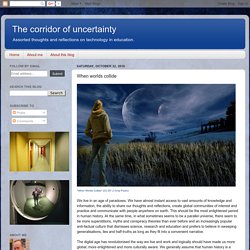
We have almost instant access to vast amounts of knowledge and information, the ability to share our thoughts and reflections, create global communities of interest and practice and communicate with people anywhere on earth. This should be the most enlightened period in human history. At the same time, in what sometimes seems to be a parallel universe, there seem to be more superstitions, myths and conspiracy theories than ever before and an increasingly popular anti-factual culture that dismisses science, research and education and prefers to believe in sweeping generalisations, lies and half-truths as long as they fit into a convenient narrative. The digital age has revolutionised the way we live and work and logically should have made us more global, more enlightened and more culturally aware. I find the filter bubble analogy (Eli Pariser 2011) a recurring theme when discussing all aspects of today's society. The Pros & Cons Of Online Anonymity - The Vuze BlogThe Vuze Blog.
Depending on which side of the fence you’re on you could see online anonymity as a blessing or a curse.
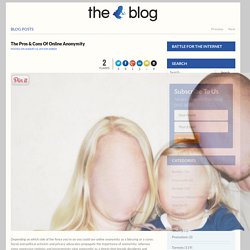
Online anonymity: Sometimes necessary, sometimes dangerous. By Sami Saadaoui Note from IGMENA: The following post is among the essays written by participants at the end of the Internet Governance Capacity Building Program (IGCBP).
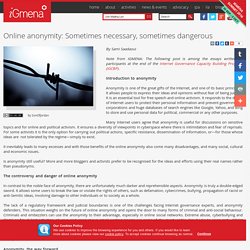
Introduction to anonymity. In 2016, Think Twice About What You Share On Social Media. Just about everyone today uses some form of social media.
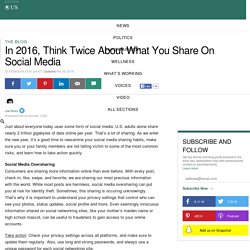
U.S. adults alone share nearly 2 trillion gigabytes of data online per year. That’s a lot of sharing. As we enter the new year, it’s a good time to reexamine your social media sharing habits, make sure you or your family members are not falling victim to some of the most common risks, and learn how to take action quickly. How social media is reshaping news. The ever-growing digital native news world now boasts about 5,000 digital news sector jobs, according to our recent calculations, 3,000 of which are at 30 big digital-only news outlets.
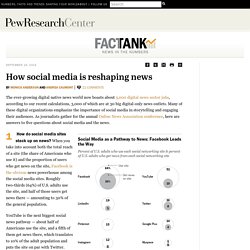
Many of these digital organizations emphasize the importance of social media in storytelling and engaging their audiences. As journalists gather for the annual Online News Association conference, here are answers to five questions about social media and the news. How do social media sites stack up on news? When you take into account both the total reach of a site (the share of Americans who use it) and the proportion of users who get news on the site, Facebook is the obvious news powerhouse among the social media sites. Roughly two-thirds (64%) of U.S. adults use the site, and half of those users get news there — amounting to 30% of the general population. Inside Facebook’s (Totally Insane, Unintentionally Gigantic, Hyperpartisan) Political-Media Machine.
Now that the nomination contest is over, Rivero has turned to making anti-Trump content.
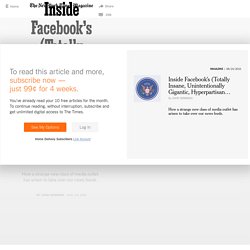
A post from earlier this month got straight to the point: “Donald Trump is unqualified, unstable and unfit to lead. Share if you agree!” More than 40,000 people did. Fomo, stress and sleeplessness: are smartphones bad for students? As with all technology, mobile phones can have their pros and cons, depending on how they are used.
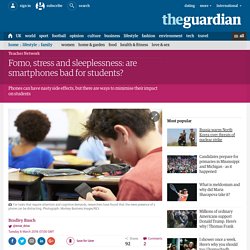
At their best, they can be useful tools for staying in touch, finding out new information and co-ordinating social activities. At worst, they can negatively affect concentration, communication and sleep, or increase fear of missing out, procrastination and stress. These potential negative consequences are especially important to consider for teenagers. Good News Spreads Faster on Social Media.
The positives and negatives of using social networking sites - BBC School Report. Image copyright PA Social networking is a topic that divides opinion - some people think it's an amazing tool but others are worried about the impact it has on people's lives.
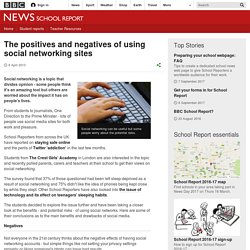
From students to journalists, One Direction to the Prime Minister - lots of people use social media sites for both work and pleasure. School Reporters from across the UK have reported on staying safe online and the perils of Twitter 'addiction' in the last few months. 12 signs that you are addicted to social media + words. Social Media Is Actually Good For Teens artikel frågor. Is Facebook Making Us Antisocial? The anti-social network: Life without Facebook. A bad breakup: Nothing can be as emotionally tumultuous for a young heart.
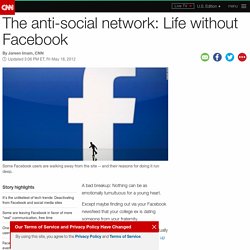
Except maybe finding out via your Facebook newsfeed that your college ex is dating someone from your fraternity. That was the defining moment that eventually led Brolin Walters, 24, to ultimately break up with something else: Facebook. "I didn't want to see what was going on with them," said Walters. "So I deactivated my account. " With a website that boasts 901 million active users and is launching an IPO on Friday, it seems unlikely that once you get on Facebook, you'd ever leave. Facebook and Its Users, Mutually Dependent. I was upset over some comments he had posted to my Facebook wall, beneath a status update about a particularly cheesy pop song I was obsessed with at the time.
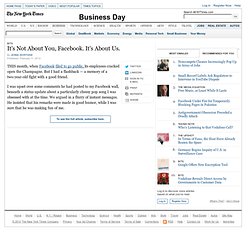
We argued in a flurry of instant messages. 12 signs that you're addicted to social media. 6. Brian from accounts, on a Monday morning, asks how was your weekend. And your first reaction is “What? Did you not see all the amazeball photos I posted on Instagram?